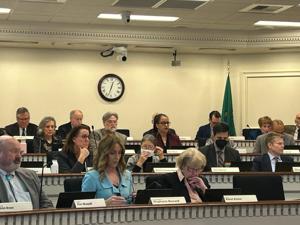(The Center Square) – It was standing room only Tuesday in Olympia for a legislative public hearing on Initiative 2111 to prevent state and local jurisdictions from taxing personal income.
The income tax is not very popular in Washington state, where voters have rejected it at least 10 times.
At a joint public hearing on Tuesday, members of the House Finance Committee and the Senate Ways and Means Committee heard testimony from citizens for and against I-2111.
Rep. Jim Walsh, R-Aberdeen, filed paperwork to begin the initiative process, part of an effort by voter advocacy group Let's Go Washington that has resulted in a total of six initiatives to the Legislature.
“Initiative 2111 is designed to do one thing, which is to codify into law the state's longstanding tradition of not levying an income tax based on personal income,” said Walsh, who also serves as chairman of the Washington State Republican Party.
He went on to say, “We have a three-legged system of property tax, sales tax, and business and profession tax, and the spirit of this measure is to focus on that good system.”
Stephen Gordon of Concerned Taxpayers of Washington also testified in support of Resolution 2111.
“Realistically, this should be unnecessary, given that the constitutional precedent and the people of Washington have been so clear on multiple occasions,” he said. “Washingtonians don't want an income tax.”
Gordon told lawmakers why he thinks so many people have signed up for the initiative.
“Because people don't necessarily believe they're getting value for the tax money they pay, crime is on the rise,” he explained. “Death rates from homelessness and addiction have skyrocketed, while affordability for primary families is becoming more out of reach.”
I-2111 had its critics, too.
Marcy Powers is executive director of the Washington Poverty Action Network.
“We oppose this bill because it does nothing for Washingtonians,” she said. “Our state still has one of the most upside-down tax laws in the country, with the lowest paid people paying the most.”
Powers also criticized I-2111 for being vaguely worded.
Sharon Chen, a former Microsoft executive, urged a vote against the initiative as well.
“I am one of the 0.2% of Washingtonians fortunate enough to pay the new excise tax on capital gains,” she said. “I'm interested in living in a place that has clean air, clean water, investments in public schools and strong communities. To get these things, we have to pay for them.
She concluded by telling lawmakers that the initiative does nothing to address the real problems in Washington.
The majority of those who spoke, however, did so in support of the proposed income tax ban, including Olympic Peninsula resident Eric Pratt.
“I'm here to offer my huge support for I-2111,” he said. “I keep hearing people say this measure does nothing, which is interesting because if this bill does nothing, what it does is protect us from something — something in the future. What we want is protection from future taxes.”
Pratt noted that taxes are already excessive.
“I'm a single father,” he said. “I don’t get any supportive services from the state. I do this on my own income with two children. If the tax burden increases, it becomes harder and harder for people like me.”
After nearly an hour of public testimony, House Finance Committee Chairwoman April Berg, D-Mill Creek, adjourned the hearing.
Sen. John Braun, R-Centralia, the ranking minority member on the Senate Ways and Means Committee, spoke with The Center Square immediately after the hearing concluded.
“they [Democrats] “They have tentatively scheduled a meeting of both chambers on Friday, and if they are going to move this matter forward, this is when it will happen.”
Asked if he thought the measure would pass, Brown replied: “It looks promising, but we'll have to wait and see. I'm still optimistic.”
On Wednesday morning, two other initiatives are scheduled to receive public hearings: Initiative 2081, which would give parents the right to inspect their children's textbooks and curriculum and obtain their children's school records, and Initiative 2113, which would eliminate restrictions on police prosecutions.
Three other initiatives will not receive hearings: Initiative 2109 to repeal the capital gains tax, Initiative 2117 to repeal the Climate Compliance Act, and Initiative 2124 to opt out of the WA Cares long-term care insurance plan.
The legislature may approve initiatives or send them to voters. If the initiative is rejected by the Legislature or the Legislature takes no action by the end of the session on March 7, the Secretary of State will certify the initiative for the next general election in November. The Legislature may also pass an alternative proposal to accompany a ballot initiative.

